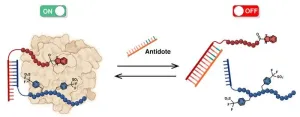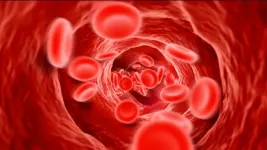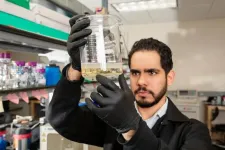(Press-News.org) Anticoagulant treatments are crucial for managing many conditions, such as heart disease, stroke and venous thrombosis. Current options, however, carry an inherent risk of serious bleeding due to trauma or unforeseen events. A team from the University of Geneva (UNIGE) and the University of Sydney has developed a new anticoagulant, designed to have an on-demand reversible activity, with a fast-acting ‘‘antidote’’. This approach could revolutionise the use of anticoagulants in surgery or other applications. The mechanism of activation and deactivation of the active principle could also be used in immunotherapy. These results are published in Nature Biotechnology.
Anticoagulant therapies are essential for managing many conditions, such as heart disease, stroke, and venous thrombosis. However, current treatment options, such as heparin and warfarin, have major drawbacks, including the need for regular monitoring of blood coagulation and the risk of serious bleeding in the event of overdose or trauma. Around 15% of emergency hospital visits for adverse drug effect are attributable to complication with anticoagulant treatments (an estimated 235 000 case/year in the US), emphasizing the importance of developing new, safer, and more effective therapeutic options.
The group led by Nicolas Winssinger, professor in the Department of organic chemistry at the UNIGE Faculty of Science, in collaboration with Richard Payne, professor at the University of Sydney, has recently developed a new anticoagulant active ingredient with an ‘‘antidote’’ to reverse its effect rapidly and specifically. This new active ingredient, presented in Nature Biotechnology, consists of two molecules targeting distinct sites of thrombin, a protein whose action is central for blood coagulation. After binding to thrombin, these two molecules combine to inhibit its activity, thereby reducing its coagulant effect. The antidote intervenes by dissociating these two molecules, thus neutralising the action of the active ingredient.
‘‘This breakthrough goes beyond the development of a new anticoagulant and its associated antidote. The supramolecular approach proposed is remarkably flexible and can be easily adapted to other therapeutic targets. It is particularly promising in the field of immunotherapy,’’ explains Nicolas Winssinger, who directed this research.
A revolution for surgery
This new anticoagulant could offer a more reliable and easier-to-use option for surgical procedures. Heparin, commonly used in this field, is a mixture of polymers of different lengths extracted from pig intestine. The result is a highly variable action, requiring coagulation tests during surgery. The new synthetic anticoagulant developed by UNIGE could help solve the problems of purity and availability associated with heparin.
One of the breakthroughs in this work lies in the use of peptide nucleic acid (PNA) to link the two molecules that bind to thrombin. Two strands of PNA can come together via relatively weak bonds that are easy to break. The research team has shown that by introducing correctly designated strands of free PNA, it is possible to dissociate the two thrombin-binding molecules associated with each other. The free PNA strand thus deactivates the drug’s action. This is a major innovation in the field.
Useful for immunotherapy
Beyond the problem of anticoagulation, this supramolecular concept of activating/deactivating the active principle could be of major interest in the field of immunotherapy, particularly for CAR-T therapies. Although CAR-T therapies are major advances in the treatment of certain cancers in recent years, their use is associated with a significant risk of immune system overreaction (cytokine storm), which can be life-threatening. The ability to rapidly deactivate a treatment with an accessible antidote could therefore represent a crucial advance in improving the safety and efficacy of these therapies.
END
A new anticoagulant with no risk of bleeding
A UNIGE team, in collaboration with the University of Sydney, has developed a new type of anticoagulant whose action can be rapidly stopped
2024-04-30
ELSE PRESS RELEASES FROM THIS DATE:
Genetic adaptations have impacted the blood compositions of two populations from Papua New Guinea
2024-04-30
Papua New Guinea (PNG) has a wide range of environments, each presenting unique challenges to human survival. Highlanders and lowlanders of PNG are striking examples of populations facing distinct environmental stress. Whereas the highlanders encounter low oxygen availability due to altitude, the lowlanders are exposed to specific pathogens that are absent in the highlands, such as malaria. Despite these strong environmental pressures, the specific adaptations of these populations have remained overlooked. A new study published in Nature Communications on Tuesday, 30 April 2024 sheds light on the genetic adaptations of Papua New Guineans in response to their unique environmental ...
Abrupt permafrost thaw intensifies warming effects on soil CO2 emission
2024-04-30
According to a recent study published in Nature Geoscience, scientists have found that soil carbon dioxide (CO2) emissions are more sensitive to climate warming in permafrost-collapsed areas than in non-collapsed areas.
This study, based on field warming experiments combined with laboratory incubation of soils from a large-scale sampling, provides new insights about permafrost carbon–climate feedback in the context of future climate warming.
Warmer temperatures have led to rapid permafrost thawing in high-latitude and -altitude permafrost regions. Abrupt permafrost thaw, ...
Scientists discover over 100 new genomic regions linked to blood pressure
2024-04-30
National Institutes of Health researchers and collaborators have discovered over 100 new regions of the human genome, also known as genomic loci, that appear to influence a person’s blood pressure. Results of the study also point to several specific genomic loci that may be relevant to iron metabolism and a type of cellular receptor known as adrenergic receptors.
The study, published in Nature Genetics, is one of the largest such genomic studies of blood pressure to date, including data from over 1 ...
Researchers identify over 2,000 genetic signals linked to blood pressure in study of over one million people
2024-04-30
The Queen Mary-led study reveals the most detailed picture yet of genetic contributors to blood pressure. The findings lead to improved polygenic risk scores, which will better predict blood pressure and risk for hypertension.
Researchers led by Queen Mary University of London and supported by the National Institute for Health and Care Research (NIHR) have discovered over a hundred new regions of the human genome, also known as genomic loci, that appear to influence a person’s blood pressure. In total, over 2,000 independent genetic signals for blood pressure are now reported, demonstrating that blood pressure is a highly complex trait influenced by thousands ...
Scientists find cancer-like features in atherosclerosis, spurring opportunity for new treatment approaches
2024-04-30
Researchers have discovered that the smooth muscle cells that line the arteries of people with atherosclerosis can change into new cell types and develop traits similar to cancer that worsen the disease. Atherosclerosis is characterized by a narrowing of arterial walls and can increase risk of coronary artery disease, stroke, peripheral artery disease, or kidney disorders. The findings, supported by the National Institutes of Health (NIH), could pave the way for the use of anti-cancer drugs to counteract the tumor-like mechanisms ...
A virus could help save billions of gallons of wastewater produced by fracking
2024-04-30
EL PASO, Texas (April 30, 2024) – An estimated 168 billion gallons of wastewater — or produced water — is generated annually by the Permian Basin fracking industry, according to a 2022 report by the Texas Produced Water Consortium. The major waste stream has proved both difficult and costly to treat because of the chemical complexity of the water.
In a new study published in the journal Water, researchers at The University of Texas at El Paso have identified a novel means of treating the wastewater generated by oil and gas production: bacteriophages.
Ramón Antonio Sánchez, a doctoral candidate within UTEP’s chemistry ...
MSD joins the Open Targets consortium
2024-04-30
Open Targets, a public-private partnership dedicated to pre-competitive drug discovery research, today announced MSD, the tradename of Merck & Co., Inc., Rahway, N.J., USA, as the latest partner to join the consortium. Open Targets aims to accelerate the development of safe and effective medicines by leveraging cutting-edge technologies to identify, prioritise, and validate potential drug targets. MSD’s expertise in drug discovery will complement the strengths of the current partners: EMBL’s European Bioinformatics Institute (EMBL-EBI), the Wellcome Sanger Institute, GSK, Sanofi, Pfizer, and Genentech, ...
U of T researchers target neurogenesis in new approach to treat Parkinson’s disease
2024-04-30
Researchers at the University of Toronto have found a way to better control the preclinical generation of key neurons depleted in Parkinson’s disease, pointing toward a new approach for a disease with no cure and few effective treatments.
The researchers used an antibody to selectively activate a receptor in a molecular signaling pathway to develop dopaminergic neurons. These neurons produce dopamine, a neurotransmitter critical to brain health.
Researchers around the world have been working to coax stem cells to differentiate into dopaminergic ...
Microbiome researchers challenge the state of the art in colon cancer biomarker discovery
2024-04-30
Leuven (Belgium) 30/04/2024 - For the first time, researchers from VIB-KU Leuven, UZ Leuven, Janssen Pharmaceutica and multiple international collaborators have introduced quantitative methods and extensive confounder control to discover microbiome biomarkers in colorectal cancer development. While multiple microbial taxa have been put forward as potential cancer-associated biomarkers in the past, this new study uncovers obscured contributions that may have resulted in incorrect associations. The results have been published in Nature Medicine.
Cancer ...
Unveiling nature's custodians: groundbreaking study highlights crucial role of scavengers in wetlands
2024-04-30
A pioneering study highlights the importance of carrion and scavengers in wetlands on a global scale. A study by researchers from the Ecology area of the Miguel Hernández University of Elche (UMH) and the Ecology department of the University of Alicante (UA) reveals the fundamental importance of scavengers and carrion in wetlands. The article, published in Biological Reviews, emphasizes that the benefits provided by scavengers far outweigh the potential drawbacks. Among their essential functions are the recycling and transportation of nutrients and the regulation of water quality, benefiting the entire ecosystem, from soil and plants to birds and mammals.
Historically, ...
LAST 30 PRESS RELEASES:
Novel camel antimicrobial peptides show promise against drug-resistant bacteria
Scientists discover why we know when to stop scratching an itch
A hidden reason inner ear cells die – and what it means for preventing hearing loss
Researchers discover how tuberculosis bacteria use a “stealth” mechanism to evade the immune system
New microscopy technique lets scientists see cells in unprecedented detail and color
Sometimes less is more: Scientists rethink how to pack medicine into tiny delivery capsules
Scientists build low-cost microscope to study living cells in zero gravity
The Biophysical Journal names Denis V. Titov the 2025 Paper of the Year-Early Career Investigator awardee
Scientists show how your body senses cold—and why menthol feels cool
Scientists deliver new molecule for getting DNA into cells
Study reveals insights about brain regions linked to OCD, informing potential treatments
Does ocean saltiness influence El Niño?
2026 Young Investigators: ONR celebrates new talent tackling warfighter challenges
Genetics help explain who gets the ‘telltale tingle’ from music, art and literature
Many Americans misunderstand medical aid in dying laws
Researchers publish landmark infectious disease study in ‘Science’
New NSF award supports innovative role-playing game approach to strengthening research security in academia
Kumar named to ACMA Emerging Leaders Program for 2026
AI language models could transform aquatic environmental risk assessment
New isotope tools reveal hidden pathways reshaping the global nitrogen cycle
Study reveals how antibiotic structure controls removal from water using biochar
Why chronic pain lasts longer in women: Immune cells offer clues
Toxic exposure creates epigenetic disease risk over 20 generations
More time spent on social media linked to steroid use intentions among boys and men
New study suggests a “kick it while it’s down” approach to cancer treatment could improve cure rates
Milken Institute, Ann Theodore Foundation launch new grant to support clinical trial for potential sarcoidosis treatment
New strategies boost effectiveness of CAR-NK therapy against cancer
Study: Adolescent cannabis use linked to doubling risk of psychotic and bipolar disorders
Invisible harms: drug-related deaths spike after hurricanes and tropical storms
Adolescent cannabis use and risk of psychotic, bipolar, depressive, and anxiety disorders
[Press-News.org] A new anticoagulant with no risk of bleedingA UNIGE team, in collaboration with the University of Sydney, has developed a new type of anticoagulant whose action can be rapidly stopped







